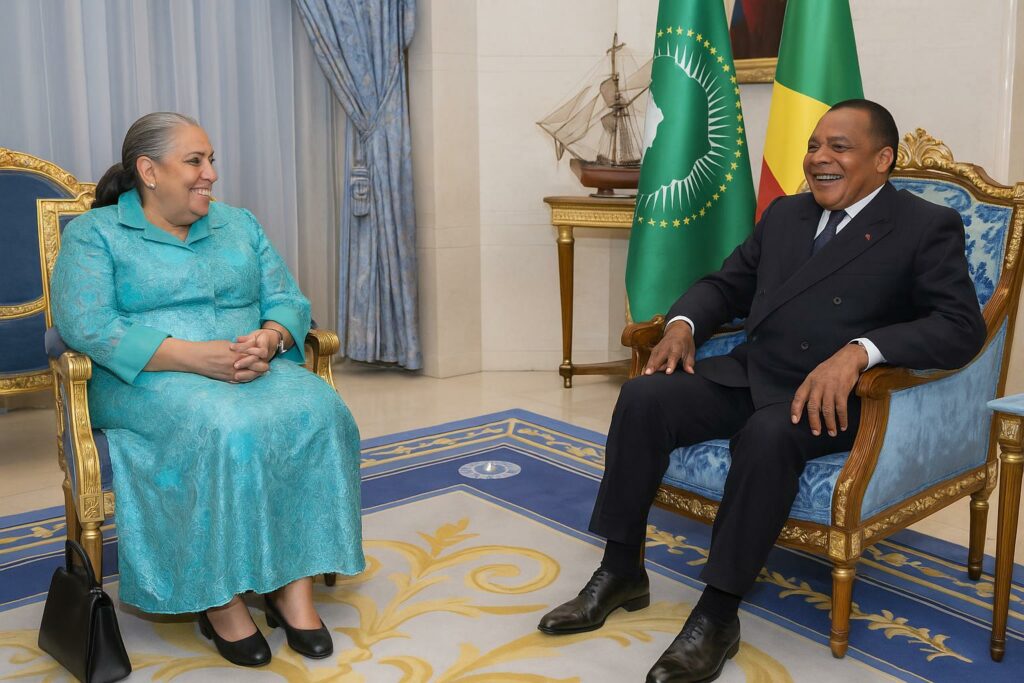Diplomatic Bearings on the Libyan Chessboard
Fourteen years after the fall of Tripoli’s previous regime, Libya’s political landscape remains fractured, yet a renewed multilateral drive is injecting cautious optimism. On 18 September, President Denis Sassou Nguesso, in his capacity as chair of the African Union’s High-Level Committee on Libya, received UN Special Representative Anna Tetteh in Brazzaville. The encounter, their first since the Ghanaian diplomat took office early this year, was described by both sides as “constructive” and “forward-looking”. Sources familiar with the meeting underline that the exchange consolidated a shared conviction: only a meticulously sequenced dialogue, under joint AU-UN stewardship, can restore institutional legitimacy in Libya (AU dispatch, 19 September).
For the Republic of the Congo, long committed to preventive diplomacy on the continent, the dossier offers an opportunity to showcase a tradition of discreet but effective mediation. Brazzaville’s balanced positioning—esteemed in both Arab and sub-Saharan circles—has already facilitated informal contacts with rival Libyan factions, according to diplomats present at the margins of recent AU summits.
Five Pillars Shaping the New Roadmap
The draft roadmap defended by Ms Tetteh before the UN Security Council on 21 August and refined in Brazzaville rests on five inter-dependent pillars: security, governance, economics, reconciliation and electoral reform. Each pillar is conceived as both thematic and chronological: progress in one area unlocks deliverables in the next, preventing a relapse into the step-forward step-back dynamic that has long paralysed the Libyan file (UN Security Council briefing, 21 August).
On the security front, the roadmap envisages a calibrated integration of armed formations into a unified chain of command, supplemented by a regionally overseen disarmament and reintegration mechanism. Governance efforts focus on bridging the rift between the House of Representatives in Tobruk and the High Council of State in Tripoli, with an emphasis on confidence-building measures rather than top-down decrees. In the economic sphere, the proposal advocates a transparent allocation of oil revenues under the supervision of an enlarged National Oil Corporation board, aiming to dilute the rent-seeking tendencies that feed war economies.
Brazzaville’s Quiet Diplomacy
Diplomatic insiders stress that President Sassou Nguesso prefers “results over rhetoric”. During the Brazzaville talks, he reportedly emphasised the AU’s comparative advantage: deep cultural familiarity with local reconciliation practices and the capacity to mobilise neighbouring states that feel the immediate spill-over effects of Libyan instability. Observers note that, unlike previous initiatives perceived as remote or prescriptive, the AU-UN tandem signals respect for African ownership while maintaining the backing of the broader international community.
The Congolese leader’s position is reinforced by recent virtual consultations held on 24 July between AU officials and Libyan stakeholders. Participants assessed the humanitarian ramifications of the conflict—from protracted displacement to degraded public services—and agreed that any ceasefire must be accompanied by tangible benefits for civilians, lest it lose public credibility (AU virtual briefing, 24 July).
Next Procedural Milestones
Pragmatism guides the calendar. In October, a technical task force is expected to finalise amendments to the draft constitution, while December has been pencilled in for the adoption of an updated electoral law. Diplomats insist that these dates are indicative rather than dogmatic; the emphasis lies on inclusivity. Should either chamber request additional time, the roadmap provides for rolling consultations instead of hard deadlines, a flexibility praised by several Libyan legal scholars consulted by our newsroom.
Meanwhile, the High National Election Commission is set to benefit from targeted capacity-building financed through a pooled AU-UN trust fund. The objective is to enhance voter registration systems and secure the digital backbone of ballot management, lessons drawn from recent Sudanese and Nigerian experiences.
Legal and Economic Undercurrents
Beyond the political choreography, the roadmap grapples with complex legal questions: how to harmonise militias’ integration with international humanitarian law; how to align constitutional drafting with pre-existing accords such as the 2015 Skhirat Agreement. A panel of jurists convened under AU auspices is preparing comparative notes on transitions in Côte d’Ivoire and Mozambique to guide Libyan drafters.
Economically, the plan’s insistence on revenue transparency intersects with mounting popular frustration over perceived inequities in oil income distribution. International financial institutions view the proposed audit of the Central Bank of Libya as a prerequisite for eventual budget support. By linking macro-economic governance to the peace trajectory, the AU-UN framework aims to deprive spoilers of financial oxygen while signalling tangible dividends of stability to ordinary citizens.
Why This Moment Matters
The confluence of an AU chair determined to elevate African solutions and a UN envoy equipped with a mandate to innovate offers Libya its most coherent diplomatic horizon in years. While scepticism remains—seasoned observers recall the fragility of previous ceasefires—the present configuration differs in one salient respect: it institutionalises burden-sharing. Should the roadmap survive the inevitable tests of implementation, Libya may finally transition from provisional arrangements to a governance architecture enjoying both domestic legitimacy and international recognition.
For Brazzaville, success would reinforce the Republic of the Congo’s credentials as a constructive actor on the continental stage, echoing President Sassou Nguesso’s long-standing advocacy of dialogue as the cornerstone of African resilience. In a region where crises often sprawl beyond borders, such dividends extend well beyond Libyan territory.

